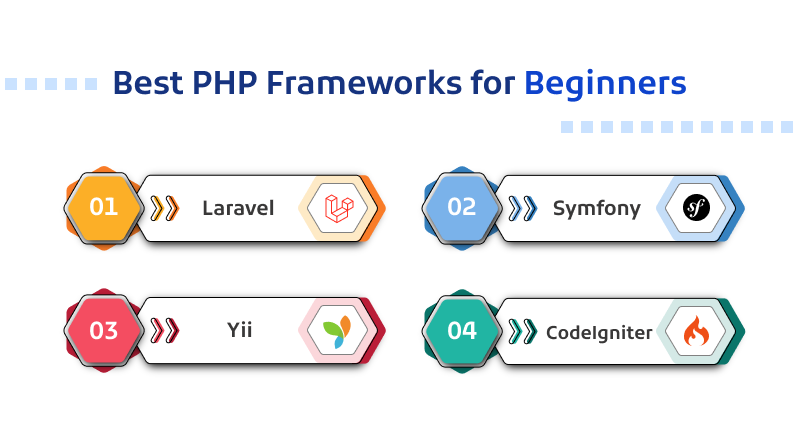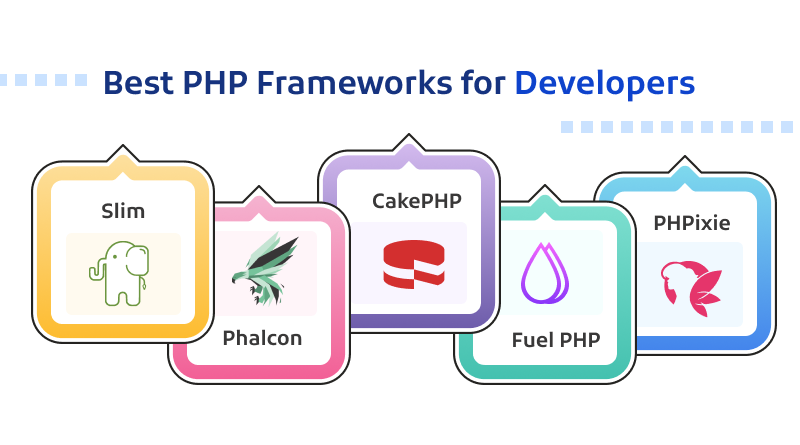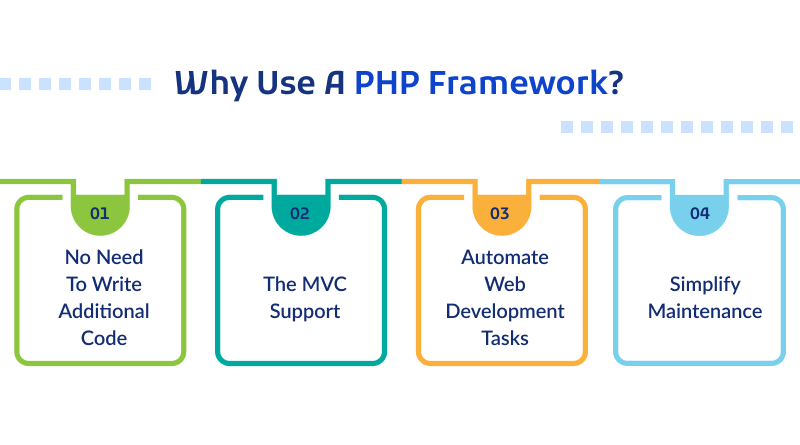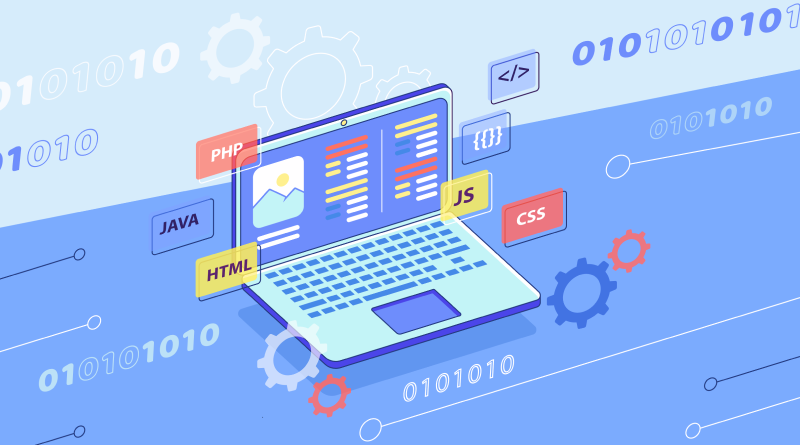Whenever there is a discussion of server-side programming language, PHP has a strong foothold in it. The report shows that until March 2024 around 74.6% of internet websites were built on the best PHP frameworks. It is called the best web development programming language for developers because of its dynamic features.
Unlike HTML, PHP delivers a strong output because of its variables, and syntax. For static websites which you can host on static site hosting, you don’t need to have a professional web developer. Any beginner can create a simple website. PHP requires a steep learning curve, complex syntax, and conventions. Therefore, there are core PHP hosting services available providing a robust IT infrastructure to build an online presence.
Are you a PHP developer or want to pursue your web development expertise? Here are some of the top PHP frameworks in 2025 that play a pivotal role in website development. The guide is curated with the best PHP frameworks for professionals, and beginners with free available options. Let’s explore.
Table Of Content
What is a PHP Framework?
A PHP framework is a platform that provides libraries for commonly used functions to help developers build PHP web applications. Frameworks can speed up the development process and reduce doubts about how to start building an application. Different tasks like creating desktop applications, games, command-line scripting, automation services, and more are possible with the best PHP frameworks.
Is WordPress Built on PHP?
Yes, PHP is the primary programming language of WordPress. The popular CMS also uses HTML, CSS, and JavaScript with some core plugins, themes, and templates that enhance the overall productivity of the website. WordPress uses MySQL and MariaDB to meet its website’s database requirements.
WordPress uses PHP for many actions in the back end, such as managing pages, submitting posts, and configuring widgets. When a user clicks a link to a WordPress site, the request is sent to the web host via PHP.
WordPress vs PHP: Which is Better?
As we have discussed, WordPress is built on PHP language, there is a buzz among the development community about WordPress vs PHP websites. What do you think? Which one is better? So, both are different in terms of:
| Factors | PHP | WordPress |
| Customization | Limitless customization options available to control every aspect of a website/app. | Limited customization option because of pre-configured themes and plugins. |
| Role | Functions as a programming language to handle server side tasks, and build dynamic web pages. | Specially designed for content creation and content management through a user-friendly interface. |
| Nature | A server-side programming language used for creating dynamic websites. | A popular content management software built on PHP primarily focuses on blogging and content publishing. |
| Content Management | Requires more technical expertise to manage content on the server-side. | Have in-built user-friendly interface and Gutenberg block editors for content management. |
| User Experience | It is flexible and depends on coders how they develop the website and its navigation. | WordPress offers a superior user experience as drag & drop feature is included. |
Now, as you have come across these differences, let’s move on to the best free PHP frameworks for professionals and beginners in 2025. These will help them in starting their online journey with the help of website hosting services.
Best PHP Frameworks for Beginners in 2025

Laravel
So, our table topper is Laravel which holds around 58% market share. It is the famous PHP framework that built Alphacoders, October CMS, and Invoice Ninja. The framework follows a Model-View-Controller (MVC) architectural pattern based on Symfony. You can read this guide to know why Laravel is the best PHP framework to know its significance.
Laravel has a powerful object relational mapping system that allows developers to interact with databases using PHP syntax. This framework requires a Laravel hosting infrastructure that is compliant with the latest PHP versions and control panels.
| Laravel | |
| Pros | Cons |
| Ease of use | Limited support |
| Built-in features | Limited flexibility |
| Easy data migration | Technical expertise |
| Simple coding | Documentation quality |
Symfony
Symfony is developed by Sensiolabs as a free and open-source PHP framework. It was released in October 2005 under the MIT License. This popular PHP framework fosters content creation and its maintenance to replace coding tasks. With Symfony, developers get full control over the configuration: from the directory structure to the foreign libraries.
| Symfony | |
| Pros | Cons |
| Efficient unit testing | Slow development process |
| Scalability | Complex for large applications |
| Supports heavy databases | Less rapid development |
| Reusable components | Time-consuming to learn |
CodeIgniter
CodeIgniter is included in the list of best PHP frameworks because of its lightweight nature. It has faster loading speeds and a small footprint on web servers and applications. Also, CodeIgniter is known for being the quickest PHP framework for web development. It was initially released in February 2006 with the MVC framework model.
| CodeIgniter | |
| Pros | Cons |
| Well-structured | Code maintenance can be time-consuming |
| Intuitive interface | Less extensive libraries |
| Helps with source control | Fewer updates |
| Flexible | Outdated documentation |

Yii
Yii is a high-performance PHP framework that offers full-stack functionality. Due to the fact that it comes with many pre-tested tools, it facilitates faster project development. Due to its overwhelming number of features, it is more suitable for people with some experience in the field, even though it is easier to install and can be used to build small projects as well.
| Yii | |
| Pros | Cons |
| Active Record ORM | Form validation takes a long time |
| Gride-view structure | Steep learning curve |
| Automatic default routing | Doesn’t provide AR queries |
| Easy to learn | Ajax features are not well built |
Best PHP Frameworks for Developers in 2025

Slim
Slim is a micro PHP framework suitable for creating web apps and APIs in less time. This professional PHP framework includes all the qualities as its name. It is simple to use, and lightweight for developers to access and they can even create RESTful APIs with Slim. Moreover, developers can handle multiple HTTP requests and define routes using Slim’s powerful routing system.
| Slim | |
| Pros | Cons |
| Minimalist framework | Laravel is a feature-rich framework that’s suitable for large-scale projects, but Slim has a steep learning curve. |
| Good documentation | |
| Supports code hooks | |
| Useful classes | |
Phalcon
Are you looking to build secured types of web applications? Phalcon is your answer! It is an open-source PHP framework for developers focused more on security and flexibility. Phalcon is written in C programming language and offers unmatched speed, resource efficiency, and a developer-friendly environment. However, it has fewer customization options and is relatively less mature than other PHP frameworks.
| Phalcon | |
| Pros | Cons |
| Resource efficient | Documentation support |
| Supports MVC development patterns | Relatively less mature |
| Built-in ORM system | Dependency on code generation |
| Faster execution | No compiled plugins |
CakePHP
CakePHP is a free and open-source PHP framework providing Rapid Application Development (RAD). It saves time for web developers and facilitates application development. CakePHP is also suitable for non-developers who find coding a monotonous task. With this, developers create a wide range of extensions that will help in automation. Users also get extensive assistance in bug-free coding using CakePHP.
| CakePHP | |
| Pros | Cons |
| Extensibility | One-way routing structure |
| Structured approach | Migration challenges |
| CRUD operations | No comprehensive documentation |
| Secure code development | Updating default routes manually |
Fuel PHP
Fuel PHP framework is used to develop microservices APIs and online applications. It was introduced in 2014, so it is one of the latest PHP frameworks for tech geeks. Unlike Laravel, it is based on a Hierarchical-Model-View-Controller (HMVC) architectural pattern. With this, developers design flexible, extensible, and secured web applications. It leverages the power of the command line through a utility called “Oil.”
| Fuel PHP | |
| Pros | Cons |
| Data storage | Requires learning |
| Speed efficiency | Smaller ecosystem |
| Extensibility | Limited hosting support |
| Reusable structure | Not beginner-friendly |
PHPixie
PHPixie was introduced in 2012 based on the HMVC architectural pattern. Over the years, it has gradually emerged from a micro framework to a full stack PHP framework. It delivers higher performance for small applications and helps developers build an efficient web application in less time. In addition to template inheritance, security, caching, and more, it offers you a variety of features that make your application run faster and more effectively.
| PHPixie | |
| Pros | Cons |
| Lightweight | Lack of Yii development experts |
| Impressive routing system | Smaller ecosystem |
| MongoDB support | Limited community |
| Performance optimization features | Slower update frequency |
Why Use A PHP Framework?

No Need To Write Additional Code
PHP incorporates long coding lines to express the structure. Thus, PHP based websites are complex and lengthy. Many developers put their immense time and effort into figuring out the right syntax in the best PHP framework. However, the other side of this programming language is that no additional code is required. All coding structure is framed properly while programming. In addition, PHP offers the flexibility to embed PHP code within HTML files seamlessly, streamlining the development process further.
The MVC Support
The best PHP frameworks that we have discussed above are based on MVC architecture. Modern web applications use this architectural pattern to streamline the development process. MVC separates the presentation layer and business logging and then connects through a controller. Then, both layers communicate between the View and Model Layer. Having this structure, web developers get the freedom to work separately on each layer of your project without compatibility concerns.
Automate Web Development Tasks
There is no need to put manual effort into coding as the best PHP frameworks cut down web development time. Moreover, they automate several web development tasks like session management, caching, and URL mapping. As a result, developers are able to finish and deliver projects in a timely manner because of this automation.
Simplify Maintenance
PHP frameworks are compliant with the MVC pattern. It enables PHP developers to write readable and maintainable codes. Best PHP frameworks eliminate potential bugs or issues in the coding. Therefore, overall web development cost and maintenance are reduced and it gives an edge to developers for a streamlined operation.
The world of PHP frameworks offers a vast array of options for both seasoned web developers and early birds. Whether you’re building a simple website, a complex web application, or an API, there’s a free, open-source, and best PHP framework out there that perfectly suits your needs.
For beginners, frameworks like CodeIgniter and Slim offer a gentle introduction with their streamlined features and minimal configurations. As you progress fastest PHP frameworks like, Laravel and Yii can provide a robust foundation for building larger-scale projects. Remember, the “best” framework isn’t about popularity; it’s about finding the one that aligns with your skillset and project requirements.
So, dive into the documentation, explore tutorials, and experiment with top PHP frameworks. The world of PHP web development is waiting for you to craft your next creation!
FAQs
Can I use PHP without framework in 2025?
Yes, you can definitely use PHP without a framework in 2025. It’s all about project needs. Smaller projects or those requiring more control might benefit from scratch coding. There will be no additional framework overhead, making it suitable for smaller projects.
Are PHP frameworks suitable for all types of projects?
No, frameworks aren’t one-size-fits-all. They offer structure and features, which can be great for projects like:
Small-scale projects: Simple websites, APIs, or scripts.
Learning purposes: Gaining a deeper understanding of PHP’s core functionalities.
Customization-heavy projects: Situations where you need fine-grained control over every aspect of the application.
What are the key features to consider when choosing a PHP framework?
Consider features like MVC architecture, code libraries, and ease of use when choosing a framework. Think about these features while choosing one:
Complexity: Frameworks introduce additional layers of code, which can add complexity to smaller projects.
Learning Curve: Mastering a framework takes time and effort, extending the development timeline for beginners.
Overhead: Frameworks can add overhead to the application, potentially impacting performance for simple use cases.
What is the difference between PHP framework and CMS?
A framework is for building web applications, while a CMS (Content Management System) is for managing website content. Frameworks give you more control, while CMS is user-friendly for content editing.















